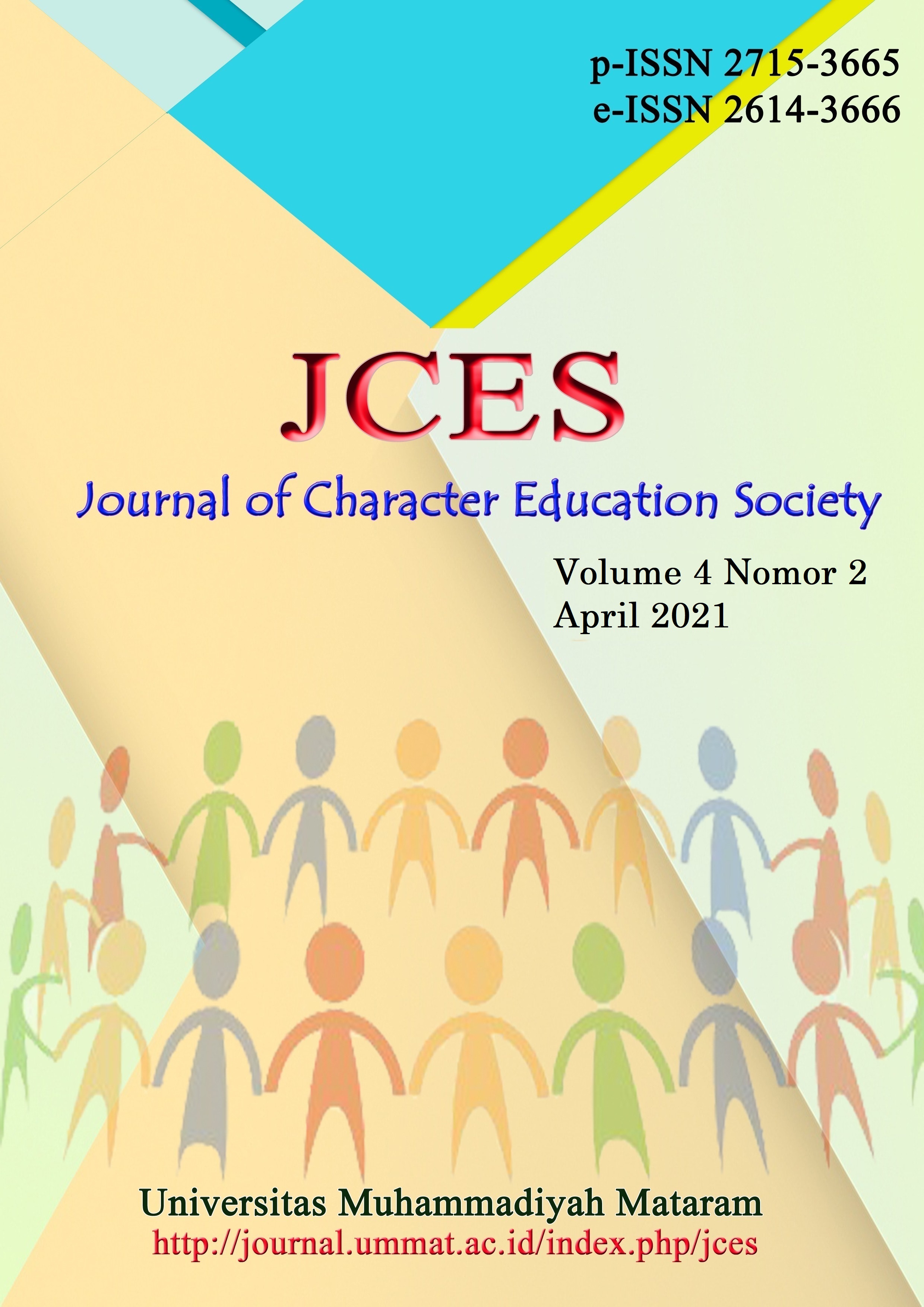THE CHANGES IN COMMUNITY KNOWLEDGE ABOUT COVID-19 VACCINE TROUGH ONLINE EDUCATION
DOI:
https://doi.org/10.31764/jces.v4i2.4140Keywords:
Covid-19, Vaccine, Online Education.Abstract
Abstrak: Kasus Covid-19 sudah menjadi pandemi di Indonesia maupun dunia. Berbagai macam vaksin sudah dikembangkan dan sudah diedarkan di masyarakat, namun masih banyak masyarakat yang meragukan keamanan dan efektivitas vaksin Covid-19. Edukasi daring ini bertujuan untuk memberikan informasi yang benar kepada masyarakat sehingga dapat meningkatkan pengetahuan dan pemahaman mengenai vaksin Covid yang sedang beredar di Indonesia. Metode yang digunakan adalah pemaparan materi oral secara daring dengan menggunakan fasilitas google meet. Sebelum dan sesudah pemaparan materi, peserta diharapkan mengisi soal pre-test dan post-test melalui google form yang nantinya akan dianalisis perbedaan rerata pengetahuan sebelum dan sesudah menerima materi menggunakan uji Wilcoxon melalui program SPSS. Rerata pengetahuan peserta edukasi daring sebelum pemaparan materi adalah 59,09 sedangkan setelah pemaparan materi didapatkan rerata skor 76,13. Pengaruh edukasi secara daring memberikan perbedaan yang signifikan terhadap tingkat pengetahuan peserta dengan p=0.004.
Abstract: The case of Covid-19 has become a pandemic in Indonesia and the world. Various vaccines have been developed and have been circulated in the community, but there are still many people who doubt the safety and effectiveness of the Covid-19 vaccine. This online education aims to provide correct information to the public to increase knowledge and understanding about the Covid vaccine that is circulating in Indonesia. The method used is the exposure of oral material online using the google meet facility. Before and after the material exposure, participants are expected to fill in pre-test and post-test questions through google form which will be analyzed the difference in average knowledge before and after receiving the material using the Wilcoxon test through SPSS program. The average knowledge of online education participants before material exposure was 59.09 while after material exposure was obtained an average score of 76.13. The influence of online education made a significant difference to participants' knowledge levels with p=0.004.
References
Anonim. (2021). Data Sebaran Covid di Indonesia.
Anudeep, T. C., Jeyaraman, M., Shetty, D. U., Raj, H., Ss, A., Somasundaram, R., Kumar V, V., Jain, R., & Dilip, S. (2020). Convalescent Plasma as a Plausible Therapeutic Option for nCOVID-19: A Review. April. https://doi.org/10.35248/2167-0870.20.10.409
Fadilah, M, Pariyana, Susanty, M., Samsir, N. I., Trisa, Y., & Syakurah, R. A. (2020). Pengaruh Seminar Online terhadap Pengetahuan Masyarakat Awam di Era Pandemik Covid-19. Seminar Nasiona AVoER XII, 19(November), 280–284.
Fadilah, Mariatul, Indah, W., Ningsih, F., Berlin, O., Wimaulia, A., Syakurah, R. A., Kedokteran, F., Sriwijaya, U., Selatan, S., Masyarakat, F. K., Sriwijaya, U., Selatan, S., Studi, P., Dokter, P., Kedokteran, F., Sriwijaya, U., & Selatan, S. (2020). Pengaruh Seminar Online Terhadap Pengetahuan Dalam Meningkatkan Imunitas Untuk Menghadapi Covid-19 Dan Persepsi Mengenai New Normal Pada the Influence of Online Seminar on Knowledge in Improving Immunity To Toward Covid-19 and Perception of New Normals in. Jurnal Kesehatan Masyarakat, 6(2), 134–149.
Hairunisa, N., & Amalia, H. (2020). Review: penyakit virus corona baru 2019 (COVID-19). Jurnal Biomedika Dan Kesehatan, 3(2), 90–100. https://doi.org/10.18051/jbiomedkes.2020.v3.90-100
Hotez, P. J., Corry, D. B., Strych, U., & Bottazzi, M. E. (2020). COVID-19 vaccines: neutralizing antibodies and the alum advantage. Nature Reviews Immunology, 20(7), 399–400. https://doi.org/10.1038/s41577-020-0358-6
Husada, D. (2020). Vaksin SARS-CoV-2: Tinjauan Kepustakaan. Journal Of The Indonesian Medical Association, 70(10), 228–242.
Juditha, C. (2020). People Behavior Related To The Spread Of Covid-19’s Hoax. Journal Pekommas, 5(2), 105. https://doi.org/10.30818/jpkm.2020.2050201
Kaur, S. P., & Gupta, V. (2020). COVID-19 Vaccine: A comprehensive status report. Virus Research, 288(July), 198114. https://doi.org/10.1016/j.virusres.2020.198114
Kemenkes RI. (2018). Kementerian Kesehatan Republik Indonesia. In Kementerian Kesehatan RI (Vol. 4247608, Issue 021).
Kementerian Kesehatan Republik Indonesia, ITAGI, WHO, & UNICEF. (2020). Survei Penerimaan Vaksin COVID-19 di Indonesia. Satuan Gugus Tugas Penanganan COVID-19, November.
Makmun, A., & Hazhiyah, S. F. (2020). Tinjauan Terkait Pengembangan Vaksin Covid 19. Molucca Medica, 13, 52–59. https://doi.org/10.30598/molmed.2020.v13.i2.52
Palacios, R., Patiño, E. G., de Oliveira Piorelli, R., Conde, M. T. R. P., Batista, A. P., Zeng, G., Xin, Q., Kallas, E. G., Flores, J., Ockenhouse, C. F., & Gast, C. (2020). Double-Blind, Randomized, Placebo-Controlled Phase III Clinical Trial to Evaluate the Efficacy and Safety of treating Healthcare Professionals with the Adsorbed COVID-19 (Inactivated) Vaccine Manufactured by Sinovac – PROFISCOV: A structured summary of a study protocol for a randomised controlled trial. Trials, 21(1), 21–23. https://doi.org/10.1186/s13063-020-04775-4
Triyaningsih, H. (2020). Efek Pemberitaan Media Massa Terhadap Persepsi Masyarakat Pamekasan Tentang Virus Corona. Meyarsa, 21(1), 1–9.
Downloads
Published
Issue
Section
License
Authors who publish articles in JCES (Journal of Character Education Society) agree to the following terms:
- Authors retain copyright of the article and grant the journal right of first publication with the work simultaneously licensed under a CC-BY-SA or The Creative Commons Attribution–ShareAlike License.
- Authors are able to enter into separate, additional contractual arrangements for the non-exclusive distribution of the journal's published version of the work (e.g., post it to an institutional repository or publish it in a book), with an acknowledgment of its initial publication in this journal.
- Authors are permitted and encouraged to post their work online (e.g., in institutional repositories or on their website) prior to and during the submission process, as it can lead to productive exchanges, as well as earlier and greater citation of published work (See The Effect of Open Access).

